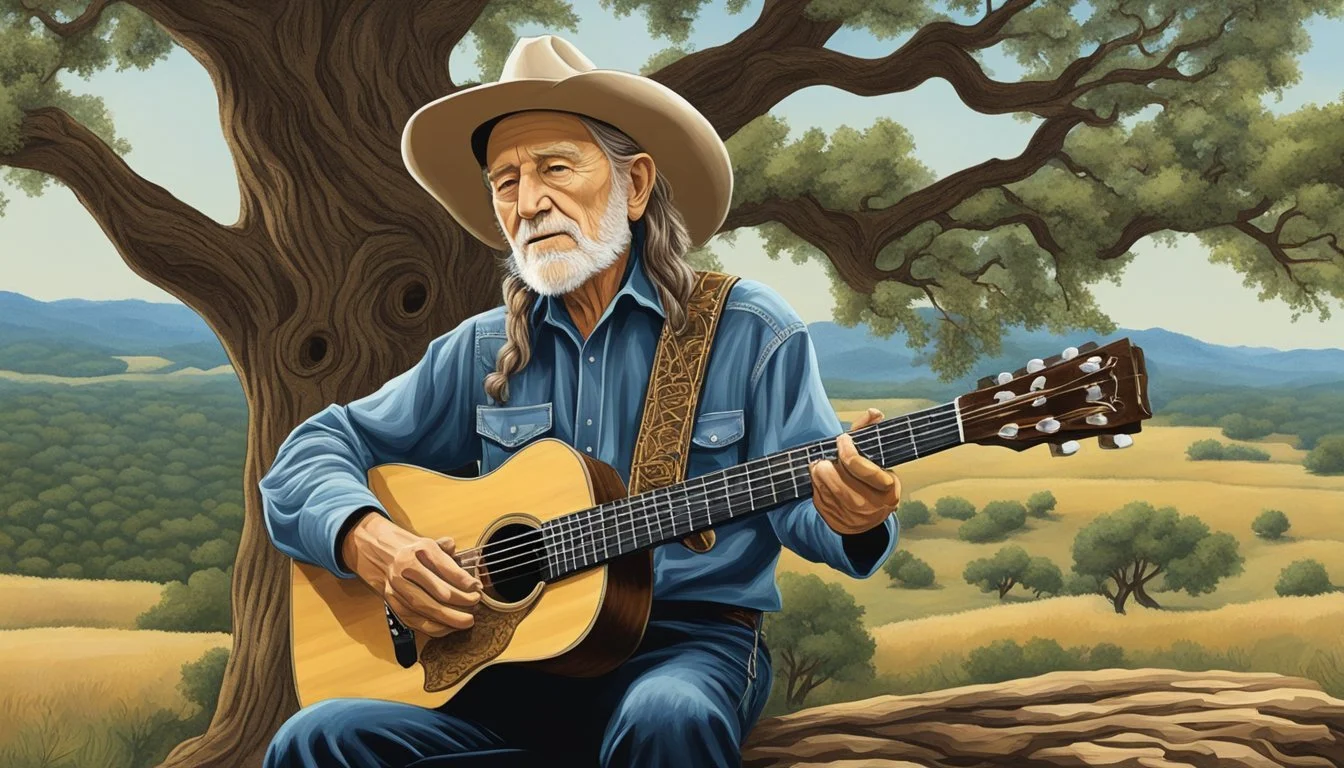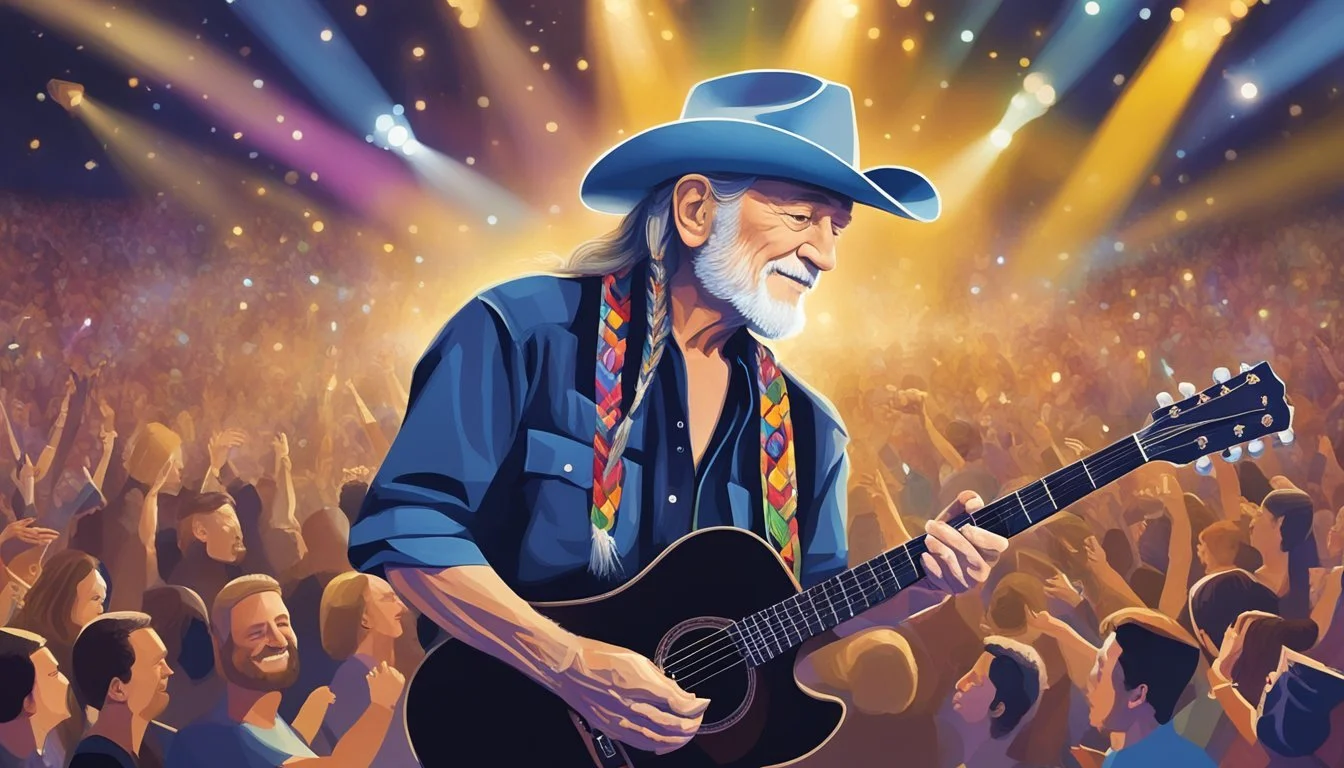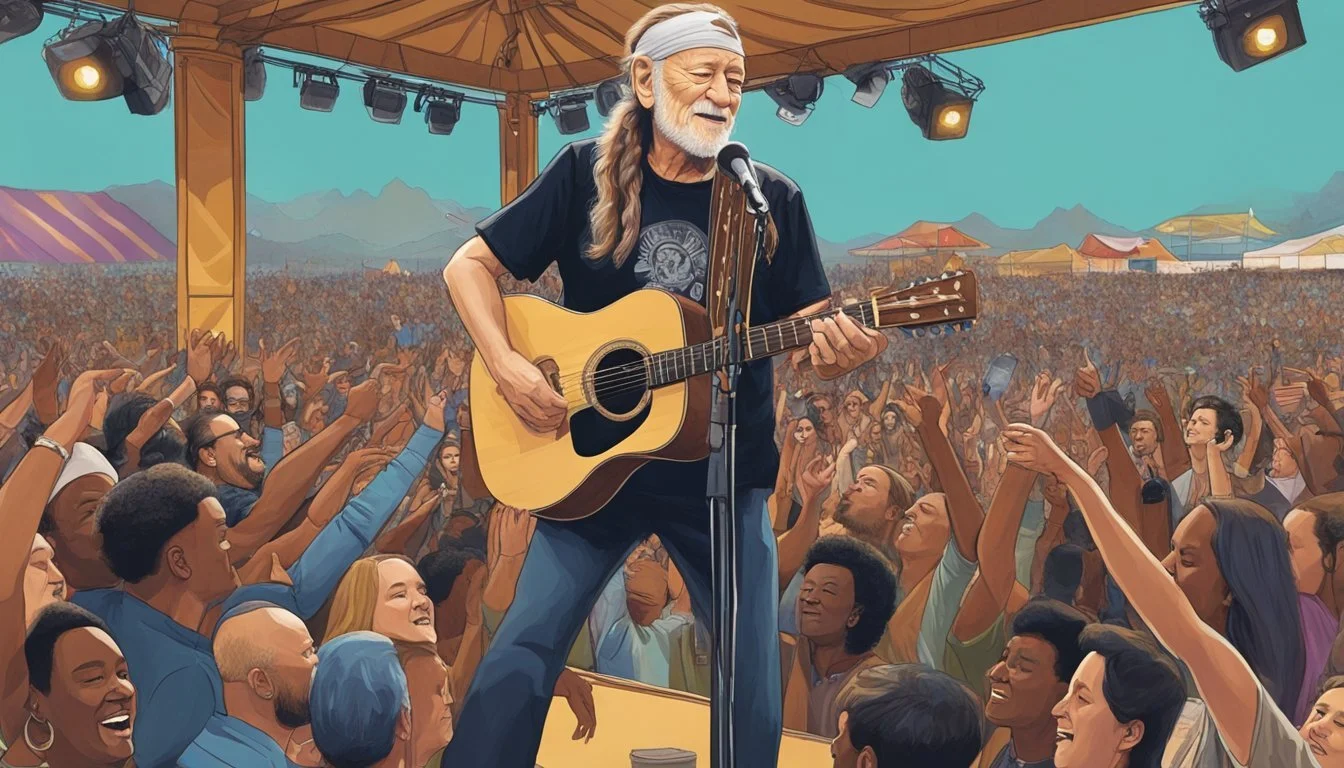Willie Nelson: The Unconventional Journey of a Country Music Legend
Willie Nelson, born on April 29, 1933, in Abbott, Texas, is an iconic figure in American country music. His distinctive voice, poetic lyrics, and unconventional style have captivated audiences for decades. Nelson's career spans over six decades, during which he has released numerous hit songs, authored books, and become a cultural icon.
As a singer-songwriter, Nelson has penned classics like "On the Road Again" and "Always on My Mind." His unique blend of country, folk, and jazz influences has earned him widespread acclaim and a devoted fanbase. Nelson's talent extends beyond music; he has also appeared in films and been a vocal advocate for various social causes.
Nelson's Texas roots have played a significant role in shaping his music and persona. From his early days performing at local dances to becoming one of the most recognizable names in country music, Willie Nelson's journey is a testament to his enduring talent and appeal.
Early Life and Musical Roots
Willie Nelson's childhood in rural Texas during the Great Depression shaped his musical journey. His early exposure to diverse musical styles and his natural talent laid the foundation for his iconic career.
The Formative Years in Abbott, Texas
Willie Nelson was born on April 29, 1933, in Abbott, Texas. Raised by his grandparents during the Great Depression, he experienced a humble upbringing that influenced his music and worldview.
Abbott, a small farming community, provided the backdrop for Nelson's early life. He worked in cotton fields and absorbed the sounds of country life.
His grandparents encouraged his musical interests from a young age. Nelson received his first guitar at six and wrote his first song at seven, demonstrating early promise.
Musical Influences and Beginnings
Nelson's musical education began with gospel hymns in church. He soon expanded his repertoire, drawing inspiration from various genres and artists.
Country legends like Bob Wills, Hank Williams, and Lefty Frizzell heavily influenced his style. Nelson also admired jazz guitarists Django Reinhardt and Louis Armstrong, broadening his musical horizons.
By age ten, Nelson was performing at local dances and events. He played with his sister Bobbie, who became a lifelong musical collaborator.
These early experiences honed Nelson's skills as a guitarist and songwriter. They also instilled in him a deep connection to his Texas roots, which would remain evident throughout his career.
Emergence as a Songwriter
Willie Nelson's talent for crafting memorable lyrics and melodies propelled him to success as a songwriter in Nashville. His ability to convey deep emotions through simple yet powerful words set him apart in the country music scene.
Crafting Timeless Classics
Nelson's songwriting career took off in the early 1960s after he moved to Nashville. He penned numerous hits that would become country music staples. "Crazy" stands out as one of his most famous compositions, showcasing his knack for heartfelt lyrics and unforgettable melodies.
The song's raw emotion and universal theme of unrequited love resonated with audiences. Nelson's unique writing style blended traditional country sensibilities with a touch of jazz influence, creating a sound that was distinctly his own.
Success with Patsy Cline and Others
Patsy Cline's recording of "Crazy" in 1961 catapulted the song to widespread popularity. Her emotional delivery perfectly captured the essence of Nelson's lyrics, helping to establish him as a formidable songwriter in Nashville.
Nelson's talent didn't stop there. He wrote "Hello Walls" for Faron Young, which became a number-one hit. Ray Price recorded several of Nelson's songs, including "Night Life" and "Funny How Time Slips Away."
These successes led to a publishing deal with Pamper Music, solidifying Nelson's position in the Nashville songwriting community. His ability to craft hits for various artists demonstrated his versatility and deep understanding of the country music genre.
Breakthrough as a Performer
Willie Nelson's rise to stardom came through his pioneering role in the Outlaw Country movement and groundbreaking albums that redefined country music in the 1970s. His unique style and authentic songwriting struck a chord with audiences nationwide.
The Rise of Outlaw Country
Willie Nelson became a key figure in the Outlaw Country movement, challenging Nashville's conservative music scene. In 1972, he moved to Austin, Texas, immersing himself in the city's eclectic music culture. This shift allowed Nelson to blend country, rock, and folk influences.
Nelson's performances in Austin's honky-tonks and music venues helped shape his distinctive sound. His long hair, bandana, and casual style contrasted sharply with the polished image of mainstream country artists. This rebellious persona resonated with fans seeking authenticity in country music.
Albums That Defined an Era
Nelson's 1973 album "Shotgun Willie" marked a turning point in his career. The record showcased his evolving sound and gained critical acclaim. It blended country with elements of rock and jazz, setting the stage for his future success.
"Red Headed Stranger" (1975) catapulted Nelson to superstardom. This concept album told a cohesive story through its songs and became a commercial and critical triumph. Its stripped-down production and narrative approach were revolutionary for country music at the time.
In 1978, Nelson released "Stardust," a collection of pop standards. This bold move further demonstrated his versatility and expanded his audience beyond traditional country fans. The album's success cemented Nelson's status as a crossover artist and musical innovator.
Collaborations and Superstardom
Willie Nelson's career soared to new heights through his collaborations with fellow music legends. These partnerships expanded his influence across genres and solidified his status as a country music icon.
The Highwaymen
Willie Nelson joined forces with Johnny Cash, Waylon Jennings, and Kris Kristofferson to form The Highwaymen in 1985. This supergroup of country music titans released three studio albums and toured extensively.
Their debut single, "Highwayman," topped the country charts and won a Grammy Award. The group's members, already successful solo artists, found renewed creative energy in their collaboration.
The Highwaymen's performances blended their distinct styles, creating a unique sound that appealed to a broad audience. Their tours became major events, drawing fans from across the country music spectrum.
Diverse Musical Partnerships
Nelson's collaborations extended far beyond The Highwaymen. He recorded duets with Ray Price, showcasing their shared Texas roots and love for traditional country music.
His work with Merle Haggard produced several hit albums, including the critically acclaimed "Pancho & Lefty" in 1983. Nelson also ventured into jazz, pop, and rock collaborations.
Notable partnerships included recordings with:
Julio Iglesias
Norah Jones
Snoop Dogg
Dolly Parton
These diverse collaborations demonstrated Nelson's musical versatility and helped introduce him to new audiences. His willingness to cross genre boundaries contributed significantly to his enduring popularity and influence in American music.
Acting and Cultural Impact
Willie Nelson's influence extends beyond music into film and American culture. His unique presence and talents have left an indelible mark on both the big screen and society at large.
Willie Nelson on the Big Screen
Nelson's acting career began in 1979 with "The Electric Horseman," starring alongside Robert Redford. His natural charisma translated well to film, leading to roles in various movies. In 1997, he appeared in the political satire "Wag the Dog," showcasing his versatility as an actor. Nelson's performances often drew from his musical persona, blending his on-screen characters with his real-life image.
His most memorable film appearances capitalized on his authenticity and charm. Nelson's acting style remained understated, allowing his innate personality to shine through in each role.
An Enduring Icon
Nelson's impact on American culture transcends his musical and acting achievements. His signature song "On the Road Again" became an anthem for travelers and free spirits. "Blue Eyes Crying in the Rain" cemented his status as a country music legend.
Rolling Stone and CMT have consistently recognized Nelson as one of the most influential artists in country music history. His advocacy for farmers, environmental causes, and cannabis legalization has further solidified his role as a cultural icon.
Nelson's distinctive look - long braids, bandana, and weathered guitar - has become instantly recognizable. This image, combined with his music and activism, has made him a symbol of American individualism and artistic integrity.
Advocacy and Social Causes
Willie Nelson's influence extends far beyond music. He has dedicated significant time and resources to supporting farmers, environmental causes, and marijuana legalization efforts.
Championing the Family Farmer
Willie Nelson co-founded Farm Aid in 1985 to support struggling family farmers. The organization hosts annual benefit concerts that have raised over $60 million to date. These funds provide emergency assistance and resources to small-scale farmers across America.
Nelson's advocacy for farmers also includes promoting sustainable practices. He has championed the use of biodiesel fuel made from vegetable oils. In 2007, he even launched his own biodiesel brand called BioWillie.
Farm Aid continues to be a powerful voice for agricultural reform. The organization lobbies for policies that support small farms and sustainable farming methods.
Marijuana Legalization and NORML
Nelson is a long-time advocate for marijuana legalization. He serves on the advisory board of the National Organization for the Reform of Marijuana Laws (NORML).
His activism includes public statements, benefit concerts, and personal lobbying efforts. Nelson has met with politicians to discuss reforming cannabis laws.
In 2015, he launched Willie's Reserve, his own brand of cannabis products. The company aims to reflect Nelson's vision for legalization and responsible use.
Through these efforts, Nelson has become a prominent figure in the push for marijuana policy reform across the United States.
Awards and Honors
Willie Nelson has garnered numerous accolades throughout his illustrious career, cementing his status as a country music legend. His contributions to music have been recognized with prestigious honors and multiple Grammy Awards.
Grammy Triumphs
Willie Nelson has amassed an impressive collection of Grammy Awards. He has won 12 Grammy Awards from 43 nominations, showcasing his enduring impact on the music industry. Nelson's Grammy wins span various categories, including Best Country Vocal Performance and Best Country Collaboration with Vocals.
In 2007, Nelson received the Grammy Award for Best Country Collaboration with Vocals. His Grammy success extends beyond performance categories, as he was inducted into the Grammy Hall of Fame in 2010. This recognition highlights the lasting influence of his recordings on American music.
Other Prestigious Recognitions
Nelson's achievements have been celebrated across multiple institutions. In 1993, he was inducted into the Country Music Hall of Fame, acknowledging his significant contributions to the genre. The Kennedy Center honored Nelson in 1998, recognizing his lifetime artistic achievements.
In 2015, Nelson received the Library of Congress Gershwin Prize, a testament to his songwriting prowess. His impact on popular music was further solidified with his induction into the Rock and Roll Hall of Fame in 2023. Rolling Stone magazine ranked Nelson #54 on their "200 Greatest Singers of All Time" list in the same year.
Discography and Artistic Evolution
Willie Nelson's prolific recording career spans over six decades, encompassing a vast array of musical styles and collaborations. His artistic evolution showcases his versatility as a songwriter and performer across country, jazz, and gospel genres.
Prolific Recording Career
Willie Nelson has released over 70 solo studio albums and numerous collaborative projects. His discography includes iconic works like "Red-Headed Stranger" (1975), a concept album that became a critical and commercial success. "Stardust" (1978) saw Nelson interpreting pop standards, expanding his audience beyond country music fans.
"Yesterday's Wine" (1971) marked an early foray into concept albums. Nelson's partnership with Columbia Records in the 1970s and 1980s yielded many hit records. He later signed with Atlantic Records, continuing to produce chart-topping albums.
Exploring Different Genres
Nelson's artistic evolution led him to explore various musical genres. He recorded several jazz albums, including "Milk Cow Blues" (2000), showcasing his guitar skills in a blues context. His venture into gospel music produced albums like "The Troublemaker" (1976).
"Teatro" (1998) featured a unique blend of country and Latin influences. In recent years, Nelson released "Band of Brothers" (2014), his first album of predominantly original material in decades. "My Way" (2018) paid tribute to Frank Sinatra, demonstrating Nelson's enduring ability to interpret diverse musical styles.
Nelson's willingness to experiment with different genres has kept his discography fresh and exciting throughout his long career.
Personal Life and Legacy
Willie Nelson's personal life has been as vibrant and diverse as his musical career. His relationships, family, and advocacy efforts have shaped both his character and his enduring impact on American culture.
Family and Personal Interests
Willie Nelson has been married four times and has fathered seven children. His current wife, Annie D'Angelo, has been by his side since 1991. Nelson's passion for music extends to his family, with several of his children following in his musical footsteps. The singer's iconic guitar, "Trigger," has been his constant companion for decades, becoming a symbol of his enduring career.
Nelson's interests go beyond music. He's an advocate for biofuels and marijuana legalization. The country star has also shown a deep connection to his roots in Central Texas, often referencing his hometown of Abbott in his work and philanthropy.
Impact on Music and Culture
Willie Nelson's influence on country music and American culture is immeasurable. His outlaw country style challenged Nashville conventions and inspired generations of musicians. Nelson's collaborations, like "To All the Girls I've Loved Before" with Julio Iglesias, showcased his ability to cross musical boundaries.
Beyond music, Nelson's activism has left a lasting mark. He co-founded Farm Aid, supporting American farmers since 1985. His advocacy for environmental causes and cannabis reform has made him a cultural icon beyond his musical achievements.
Nelson's resilience in the face of adversity, including his well-publicized issues with the IRS in the 1990s, has only added to his legend. His autobiography, "It's a Long Story: My Life," and albums like "Family Bible" continue to share his legacy with new generations.









